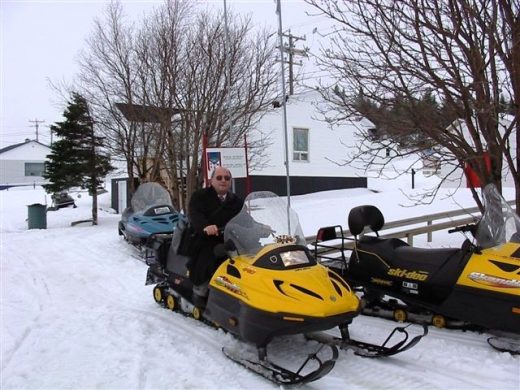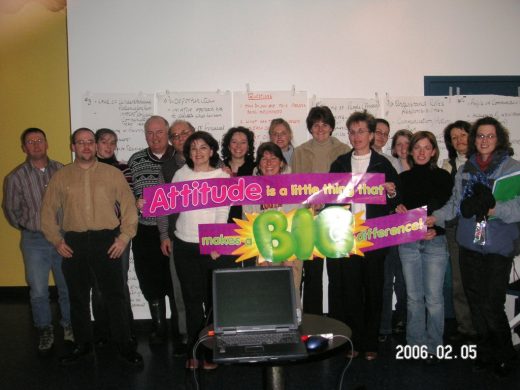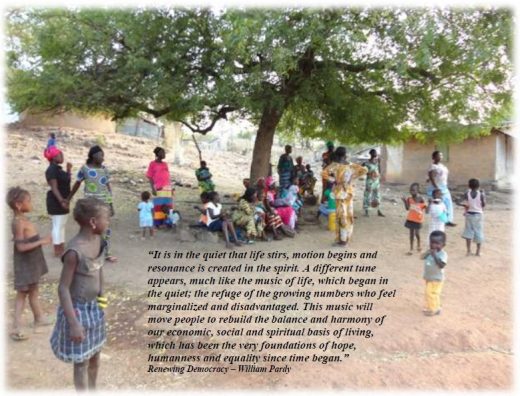
(The Picture – Heading to the office on my rental machine that will be used to travel along the string of communities along the Lower North Shore of Quebec to engage people in a series of CED workshops to address their serious issues of fisheries collapse and its implications)
This presentation was delivered to our Canadian Federal Partners in our CEDEC intiative during a fishing crisis affecting rural and remote communities in the coastal areas of Quebec
Community is more than the sum parts of physical infrastructure, much more than the social environment in which people live and fundamentally more than the services which people have come to expect. Community is the primarily intangible environment where people co-exist, raise families and build memories. The challenge of building community capacity and subsequently using this capacity to create a community economy is fraught with perils, some internal and many more which are external. The process, through which this is accomplished, because of its nebulous nature and long term necessities, evolves consistently, encountering many obstacles which create vulnerability. This vulnerability is a reflection and a microcosm of the community and its own vulnerable nature.
The fragility of community can be currently witnessed in areas like the Gaspe, the Lower North Shore and in areas of the Magdalen Islands. The fishing quota cuts are creating an environment where people have to dig deep within themselves as they ask – what next. My experience throughout Quebec over the last three plus years suggests that this environment is reflected throughout much of the English speaking community of Quebec as they have asked themselves many times over the past years – what next.
The fragility is in the moment, in the short shocks that rattle people, shake their confidence and open the avenues to potential despair. Some moments last a long time and some are so disruptive that they totally unsettle the foundations of community resulting in long lasting effects and eventual dissolution of community and all that it means. Once the environment of community is shattered the sense of community is lost forever and has to be rebuilt in a whole new context.
I have experienced this many times in my work and most recently on a study tour with the Magdalen Islands CEDEC to Newfoundland. Here a small French community has over the last twenty five or more years endeavored to accomplish the task of rebuilding itself from its language and culture up (much of which was given up by the generations doing the rebuilding). Its fragility is still evident and who knows when a new shock will damage the rebuilding process to the detriment of those who live there and, as a lost to those in its environs. The ultimate result of such a shock would ensure the loss of a way of life that has contributed considerably to the wider community though its different cultural and learning experiences.
In my last report I asked for a moment of reflection and this month will provide you something to reflect upon. I share these thoughts because of the similarity of the fragility of many English communities in Quebec. I also want to impress upon you the fragility of the Community that we have built in this process – the partnership of the Community Table between the many communities of the English speaking community of Quebec. As well as there is the partnership between the community and its government colleagues.
Sudden shocks are very unsettling, more so to fledgling communities. We have had such a shock over the past few months with the knowledge that our process is built on a foundation of a program called Labor Market Partnerships. It is not the program that is the dilemma but the interpretation that is placed upon it by those totally unfamiliar with what we do and how we do it. The challenge of this discovery of Labour Market Partnerships and the influence on our work has unsettled everyone involved on the community side and has been cause for reflection. More importantly, the movement from a long term planning process to a very short window (a three month agreement) certainly has caused uncertainty for all of us. We, in the community, might say another shift for this community in a long road of twists and turns along a three plus year journey where straight pathways have never seemed to last for very long.
This reflection is to impress upon our government partners that we have a whole group of very dedicated hard working staff who have no tenure, at best a one year life span, and then all of a sudden only a term of three months duration. We also have a huge number of volunteers who are contributing their time and talents in an unprecedented fashion who have to consider to what end am I giving my time. I do realize that things happen, often without forewarning, but in true partnerships much like in true communities people rally, come together and find resolutions to whatever the problems that must be faced, especially so, if they are committed to their communities and committed to the intangible environment that is community.
Our initiative has been since its inception one based on Community Capacity Building and Community Economic Development. This process marches slowly forward as we wend our way along the road to community enlightenment, thoughtfulness and activity. It will influence labor markets and the partnerships that facilitate them, if it is given time. It is supposed to influence Government policy programs and services and how they are delivered to communities. For this to happen it must be given understanding and appreciation. Appreciation, most importantly, to the resilience of our staff and volunteers, their patience and perseverance, and to whom we owe the slow steady progress that has been made over a very short three year period. There is a challenge before us currently, one that can shake our Community Table to its foundations or one that can strengthen the sense of community between government and community that most us have found so refreshing. That challenge can’t be ours alone it has to be shared. How this challenge is to be addressed is the issue that is provided for your reflection.

